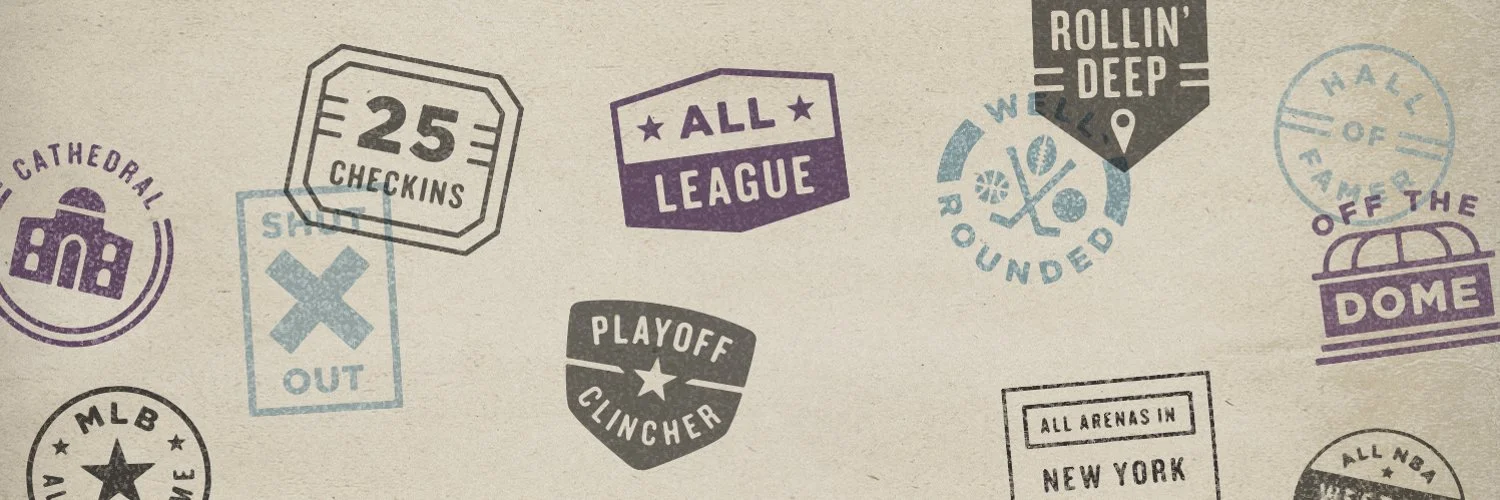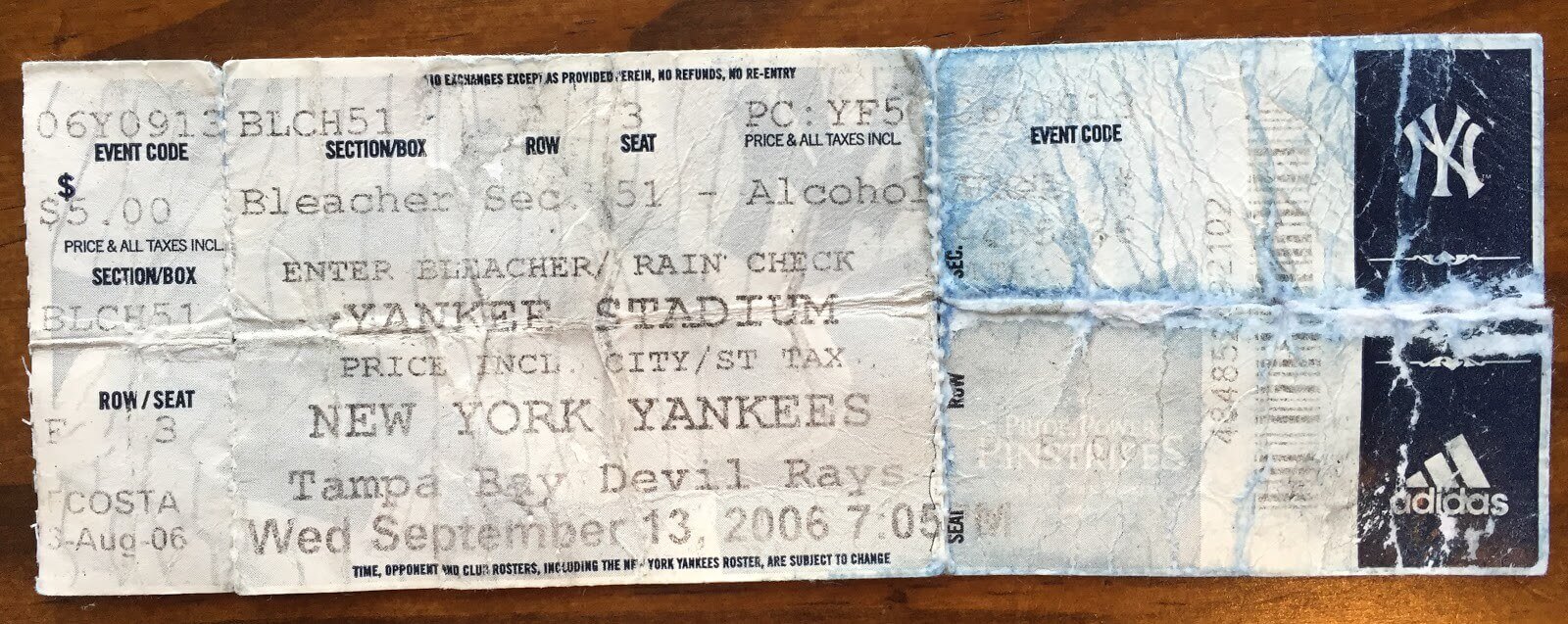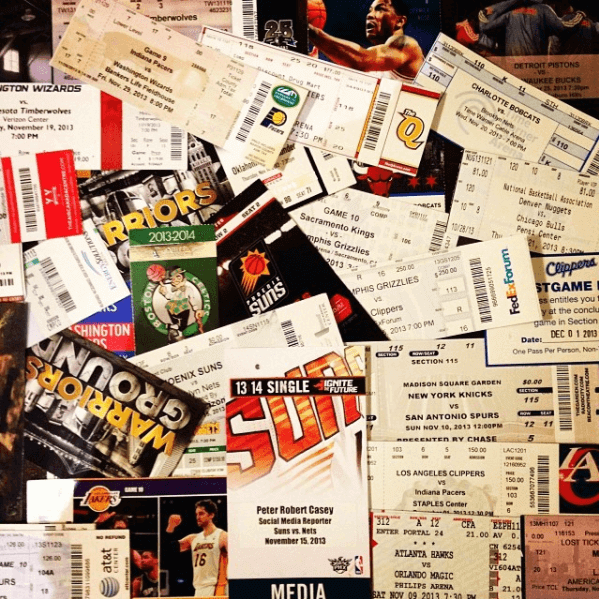
By
Peter Robert Casey
•
4 min read
February 9, 2017

There are some details I’ll never forget. It was a cool mid-week, mid-September night at the old Yankee Stadium. September 13, 2006, to be exact.
The Bombers were hosting Tampa, and I was hosting a dozen Columbia graduate students, where I worked and studied at the time, along with some friends and their co-workers. We even made a pit-stop at Stan’s Sports Bar, a River Avenue staple, before the first pitch.
The on-field specifics remain fuzzy. I don’t recall Robinson Cano’s five-run outburst, A-Rod’s deep third-inning dinger over the center-field fence, or the final score for that matter (Yankees won, 8–4. I looked all of this up on Sports Passport!). But every time I see or hold the washed and weathered ticket stub, I’m immediately transported back to Section 51 in the outfield bleachers, sitting next to a charming woman with a Croatian accent. Her name was Martina, a compliance officer from Lehman Brothers. It was the first time we met.

Ticket stubs are great at that. Not matchmaking, but memory-evoking. Each one of those flimsy cardboard keepsakes represents a moment in time: Sitting in the Shea Stadium uppers with my family as a kid, rushing the court at Bramlage Coliseum to celebrate an in-state rivalry win over Kansas, or watching the Knicks clinch a Playoff berth after a 10-year drought. Instant nostalgia.
That’s why I’ve always held onto stubs. It turns a simple shoebox into a time machine.
In 2013, I teamed up with Kyle Whelliston of Mid-Majority fame to create a virtual and bottomless version of the shoebox. We called it Basketball Passport: a website for fans to track and chronicle every NBA and college basketball game they attend. The premise was simple: Fans can check-in to games, real-time or retroactively, and preserve their memories. Check-ins unlock achievement “stamps” (Because it’s a Passport!) and generate personalized stats and standings.
How many games and venues have you been to, who else was there, what are the best performances you’ve seen, and what is your favorite team’s record when you’re in the building?
I launched the site with a crazy but calculated marketing stunt: Traveling 30,000 miles to see ‘30 NBA games in 30 days’ to capture the ‘All NBA Arenas’ stamp on Basketball Passport. Luckily, the initiative was picked up by the press: Print, digital, TV, radio, and even overseas media. Publicity built our initial user base and created demand for us to serve other sports.

Additional sites for baseball, football, and hockey soon followed, and we closed out 2015 with a successful crowdfunding campaign that also brought New York Life on board as a presenting sponsor, which allowed us to consolidate our databases, infrastructure, and front-end into a single, mobile-responsive user experience. As fate would have it, a squatter was retiring from the domaining business at that precise time. For a cool $804, Sports Passport (.com) was born.
After surviving the ServerAxis scandal of early 2016 that took down Women’s Basketball State and thousands of other sites, including ours, Travelers graciously rallied behind the rebuilding efforts, which grabbed the attention of Forbes and opened the door to seed capital, enabling us to level up our technology, build the Sports Passport iOS app, and triple down on sports nostalgia.
Why nostalgia?
As the rest of the world tries to relentlessly solve the in-game fan experience and future of sports, we’re recapturing the past.
Deadspin founder Will Leitch once put it this way in his Sports on Earth column:
… [By] logging your own games, and your own stadiums, and your own experiences. It makes those memories concrete. It makes so they won’t go away.
Sports Passport lets you literally tap into those fond memories anytime you want, anywhere you want. Right from your mobile device. Nostalgia’s a powerful drug. When we remember a game, we don’t just recall where we sat or who we sat with; we remember how we felt. The emotions of the experience. And our memories have a strange way of making the past seem a little brighter and better than it actually was.
That’s the pull of nostalgia.
Kids grow up to be consumers. If you don't have a youth fan strategy, you're behind the eight ball.
Read More
Nostalgia’s also an extremely effective trigger for social sharing. It appeals to millennials longing for a former time, former place, former game — the “good ol’ days” — when life was good and their favorite team was better. By using modern technology, a mobile app and mobile-first website, Sports Passport makes it fun and easy for fans to walk down memory lane. We now have over 480,000 games in our database across five sports (MLS, baby!) and eight leagues.
Nostalgia’s a powerful drug. When we remember a game, we don’t just recall where we sat or who we sat with; we remember how we felt.
Peter Robert Casey, Co-Founder and CEO of Sports Passport
Lehman Brothers didn’t survive the 2008 financial crisis, and Martina voluntarily walked into another one — she married me that same year. She’s okay with my burning passion and propensity for Being There. And leagues are, too. With the low cost, high quality, and easy convenience of watching games from your couch, many leagues are having a harder time getting butts in seats.
But where there’s a problem, there’s an opportunity. Sports Passport validates and incentivizes game-going behaviors, and opens up the door to reward fans for the energy, effort, and expense of live attendance. Beyond just stamps and leaderboards. That’s where we’re headed. Hopefully, with more good partners and people. I invite you to join us. It’ll be fun.
Now, if only we could bring back the old Yankee Stadium.
Get Hashtag Sports in Your Inbox
Learn how to connect with the next generation of sports fans

Peter Robert Casey is a Co-Founder and CEO of Sports Passport. He has steered and stewarded online communities for several sports brands, including Nike, the New York Knicks, FIGHTBALL, and Five-Star Basketball. Connect with PRC here or download the Sports Passport app to track, chronicle, and relive every game you attend.
